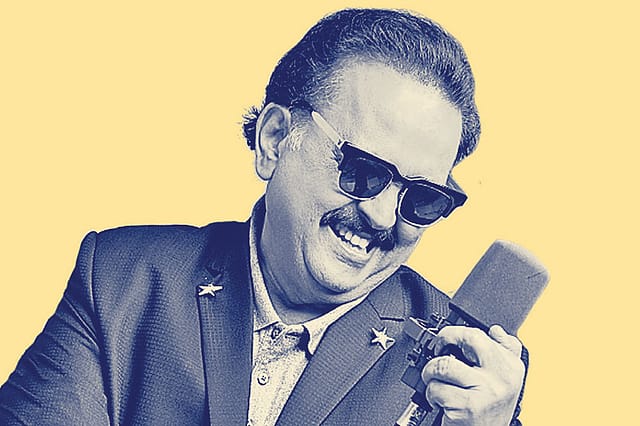SP Balasubrahmanyam (1946-2020): A Versatile Voice

NO PIECE OF MUSIC, however strictly notated, is entirely predetermined. A song exists as a dialogue between the constant of the compositional idea and the change that is the singer's interpretation and improvisation of it. A playback singer, in particular, is capable of appealing to several layers of the listener's attention with the way he or she carries the attitude of the piece. SP Balasubrahmanyam's greatness lay in his ability to convey raw human experience—the contentment of a happily married man in Samsaram enbathu veenai (Mayangugiral Oru Maadhu, 1975), the defiance of the working-class hero in Raman andalum Ravanan andalum (Mullum Malarum, 1978), a husband's longing in Kadhal rojave (Roja 1992). SPB breathed life into compositions without letting his musical virtuosity overtake the dramatic roleplay, and this made him the presiding sound of Tamil and Telugu film music for half a century. The words 'prolific' and 'versatile', so often used to describe SPB's prodigious output of 40,000-plus songs, don't begin to describe his influence over listeners for whom his voice was the background score of their lives, and who are now flooding the internet with tributes and playlists in the wake of his death at the age of 74 after hospitalisation with Covid-19.
From his debut in 1966 in the Telugu film Sri Sri Maryada Ramanna to a yet-to-be-released song from Rajinikanth's upcoming Annaatthe, SPB's long and busy career serves as a barometer for the musical tastes of the times. Having entered films when the song was a catalytic narrative force and fuel for a character's exploration of his consciousness, SPB flexed his vocal cords for some difficult compositions by MS Viswanathan and KV Mahadevan before teaming up with his friend Ilaiyaraaja to sing some of the most popular songs ever in film history. The pair reinvented the romantic melody at the apex of their powers, introducing rhythm, a folksy simplicity and a tingling sense of anticipation, in film after film.
AIming High
20 Feb 2026 - Vol 04 | Issue 59
India joins the Artificial Intelligence revolution with gusto
"SPB's strength was light-hearted romantic numbers, where there was a certain playfulness, a levity, and almost dandyish decoration. It came very easily to him," says film writer and historian Vamanan. "But he could effortlessly handle any composition you gave him—and he was lightning fast, which became important. During the opening years of Ilaiyaraaja, when there was a certain romance in the air, SPB naturally became the man to belt out the maximum number of hits." Vamanan rates his songs between 1967 and 1980 as his golden period in Tamil—that would include the best of Viswanathan, Mahadevan and SP Kodandapani, SPB's godfather in films, who had believed in him before anyone else did. Besides voice-acting and acting, SPB wore the composer's hat for a few films, including Unnai Charanadainthen, a 2003 Tamil production by his son SPB Charan. It features a song about friendship—Natpu natpu—where the roles are reversed, with MS Viswanathan singing and SPB and Ilaiyaraaja joining in.
The singer Srinivas, who worked with SPB on several films and albums, calls him the "Bhishma Pitamaha" of Indian film music. "He was the opposite of controversial," Srinivas says. "As a co-director at the ISRA (Indian Singers' Rights Association), I have seen him reconcile issues at close quarters—he didn't believe in wasting time on conflict," says Srinivas, who was to record a devotional song with SPB upon his return from hospital.
People who knew 'Balu Sir' speak of his irrepressible wit and zest for life. "I have to wear a helmet to your recordings," SPB would joke to composer Ramesh Vinayakam, for whom he had a soft corner since launching his career in 1986. "He considered me a demanding composer. We had our share of fights—I would insist on precise timing for a certain sangati and he would say I was too finicky. But it would always end well—sometimes with him boxing my ears," says Vinayakam. He was training to be a chartered accountant when an assurance by SPB was all it took for him to give up the profession and plunge headlong into music. The duo collaborated on devotional music albums and Telugu film songs, but Vinayakam regrets not composing a Tamil film song for SPB. For fans, too, notwithstanding the overwhelming legacy SPB leaves behind, it is the music he had yet to make that has settled on the mind like a shadow.
